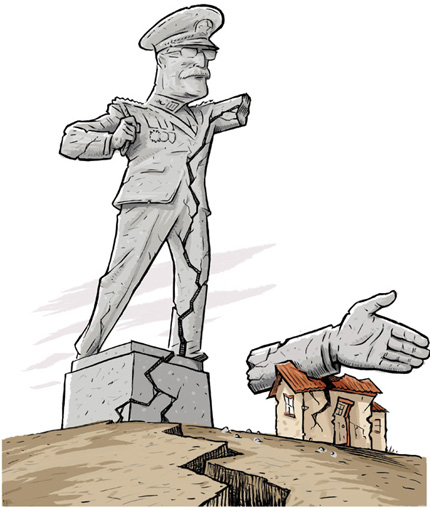political science
Death, Dictators, and Democracy
What natural disasters reveal about
political power structures
by Wesley Yang
In January 2010, a 7.0 magnitude earthquake in Haiti killed 222,000 people. A month later, when a stronger earthquake hit Chile—at a magnitude of 8.8, some 500 times more potent—only 500 people died. Chile is a much wealthier country than Haiti, but wealth doesn’t account for the vast disparity in lives lost. The resilient infrastructure and competent emergency services that make the difference between life and death in a disaster can exist in poor or in rich societies, two NYU political scientists, Alastair Smith and Alejandro Quiroz Flores (GSAS ’10), argue. The difference, they say, is politics.
Consider two earthquakes that struck in Peru: In 1970, a 7.9 magnitude quake killed 66,000 people. In 2001, an even stronger one killed fewer than 150. The wealth of the country had not changed: Between 1970 and 2001, income remained nearly identical in real terms. But in 1970, Peru was under military rule; in 2001, it was a democracy. And while Haiti is now a democracy, years of autocratic rule had left the country without the infrastructure and response services it desperately needed.
After mining a database of historical disaster statistics dating to the early 20th century, the professors confirmed that this pattern holds. “You have a better chance surviving a disaster in a poor democracy than a rich autocracy,” says Smith, who with Flores published a paper on the findings in last July’s issue of Foreign Affairs. And the reasons behind the difference are based entirely upon the structures through which rulers remain in power. Democratic and autocratic politicians face very different sets of incentives, Smith says, which end up motivating their actions when faced with crisis.
Democrats have to please a large segment of the voting public and will be punished if they fail to provide public goods, such as the enforcement of building codes, or contingency plans to protect people when disaster strikes. Public protests and a change in leadership become twice as likely in the aftermath of a major earthquake. The Bush administration’s laggard response to Hurricane Katrina, in which nearly 2,000 Americans died, Smith says, probably contributed to the Republican party’s poor showing in the 2006 and 2008 elections. It’s too early to predict what impact the March 11 earthquake and tsunami in Japan will have on its politicians, although Smith, who co-authored this fall’s The Dictator’s Handbook (PublicAffairs Press) with NYU professor Bruce Bueno de Mesquita, believes the strong infrastructure and efficiency of Japanese relief services saved many lives that would have otherwise been lost.
In the case of autocrats, however, they have to please a small minority of the governing power elite—either generals at the top of a military hierarchy or a tiny group of wealthy cronies—who will punish them if they fail to dedicate the public purse to their private enrichment. The fact is, an autocrat has an incentive to do as little as possible to protect the majority of his people. “Deaths are actually good for autocrats,” he says. “They help them stay in office.” This is partly because, as Smith and Flores observe, “Dead people cannot revolt.” But it’s also because the flow of international aid is often a boon to autocrats; dispensing funds to their cronies helps them consolidate their hold on power.
Both autocrats and democrats are rational actors seeking to maximize their self-interest, Smith says. Changing their behavior is a matter of changing the incentives they face. It would do no good to exhort an autocrat whose rational self-interest is to do little or nothing for his people. But, Smith adds, democrats do not necessarily deserve the moral credit they seek when they act to protect citizens. They too are ultimately serving their rational self-interest.
“You have a better chance surviving a disaster in a poor democracy than a rich autocracy.”







